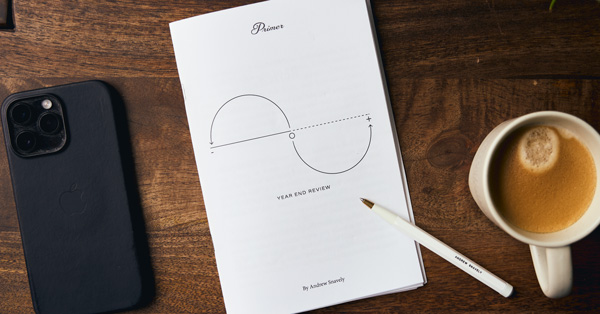We live in the age of anxiety.
Every waking moment, we’re bombarded with demands for our attention, enthusiasm, and outrage. From advertising to calls-to-action to doom-scrolling to the destruction of the work/home-life barrier, contemporary life keeps us in a constant state of heightened emotion without rest or escape. It’s not all intentional (though plenty is) but the effect is the same: we’re made physically unhealthy, mentally exhausted, and existentially disempowered.
Being herded from one decision to another (with our emotions used as a cattle prod) isn’t just a bad life – according to many great minds, it’s not living at all. When the chaos of life tries to drag us off our path, we need to hold our ground with stillness.
Mental Stillness
At its most basic, “stillness” is a mental state in which we are consciously and calmly recognizing our feelings, analyzing their causes, and most importantly, choosing how we want to respond. It’s a state of practiced self-control in the face of pressure. In moments of crisis or periods of stress, our actions are formed by the strategic parts of our minds, rather than the reactive.
It may sound simple – maybe even frustratingly so – but the truth is that many of us aren’t particularly disciplined when it comes to regulating our emotions. Lack of stillness doesn’t mean we’re having a nervous breakdown in the frozen food aisle (not necessarily, anyway) – more often than not, it shows us up as a feeling of being constantly on the back foot or never fully in control.
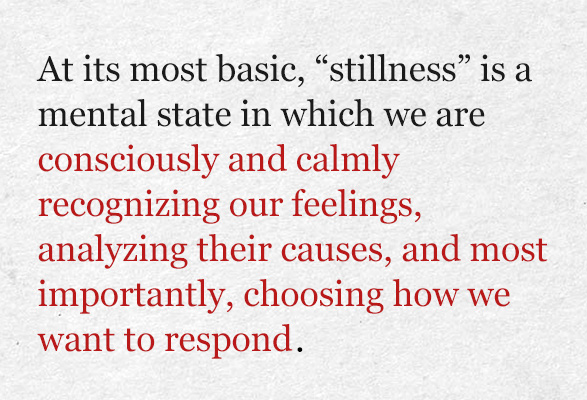
We might let a particularly nasty customer at work get us riled up, leading us to medicate with a couple beers. As a result, we have trouble sleeping, wake up exhausted, and pound an energy drink to compensate. That caffeine ramps up our heart rate, making us anxious and edgy, in turn making us snap at a minor problem. After that comes the guilt, the defensiveness, and the next thoughtless reaction.
Let’s be clear here. Creating mental stillness doesn’t stop us from encountering nasty customers or nights of poor sleep or colleagues who make mistakes. Creating mental stillness does let us choose for ourselves how we want to react to all that.
When we’re being pressured by a salesman, stillness helps us stick to our budgets. When we’re in the heat of an argument, stillness keeps us from saying something unforgivable. When we’re faced with an emergency, stillness is what lets us lunge into action instead of staying frozen in panic.
The decisions we make in critical moments can shape the direction of our lives for years. While there’s never any guarantee that the choice we make in any situation will be the “right” one, the only way for us to live life on our own terms is to know that decisions were made by us, not for us. It all starts with:
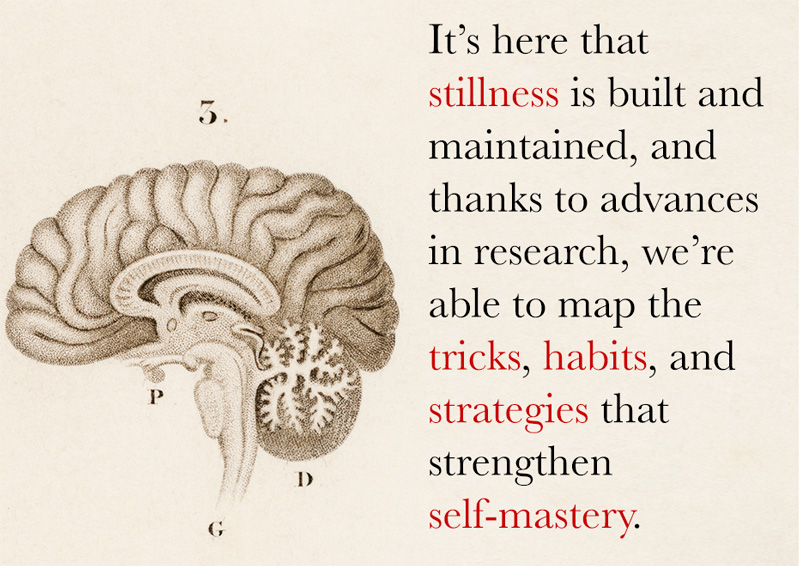
Building Better Brains
Improving our ability to respond, rather than react, isn’t simply a matter of “being calm” – it’s a matter of retraining and rewiring our brains. The good news? We know exactly where to start.
The prefrontal cortex.
Located directly behind our foreheads, the prefrontal cortex is the command center of the brain – controlling self-awareness, self-regulation, and decision making (called “executive functions” in neuroscience). It’s here that stillness is built and maintained, and thanks to advances in research, we’re able to map the tricks, habits, and strategies that strengthen self-mastery.
It’s crucial to note, however, is that there’s no single cure-all when it comes to bolstering our defenses. Cognitive neuroscientist Sabine Doebel warns that one-off brain-trainings like playing chess don’t improve our executive functions overall but just in that narrow area (i.e., playing chess). The trick, Dr. Doebel holds, is motivation and real-life application. In the chaos of modern life, reconquering our minds isn’t going to take one weapon – it’s going to take a whole arsenal. It all starts with…
Short Term Solutions
Affirmations
It might sound corny but research has backed it time and again. Authentic confidence keeps us level when we’re confronted with pressure, and there’s no better way to remind ourselves that we’re capable than by literally reminding ourselves that we’re capable.
I don’t need to jump when someone’s goading me. I don’t need to get swept up in the panic over this new crisis. I don’t need to worry about being immediately good at something. I am my own man.
Besides increasing activity in the prefrontal cortex, self-affirmation helps re-center us, telling us that – no matter how tense things are right now – there are things that matter more. Goals worth getting to. Codes worth upholding. Faced with outside forces? Few things help more than having a simple set of lines to repeat in our heads to remind us that we’ll still be standing long after the storm is gone.
Cognitive Reframing
Reframing (also called “reappraisal”) is the practice of giving ourselves some much-needed perspective – especially in heated moments.
It sucks to get cut off in traffic. It sucks to get cut off in traffic and spill coffee over our jacket in the process. It sucks to show up late to work hot, flustered, and with the unpleasant sticky feeling soaked through our sleeve.
But it’s not the end of the world.
In moments like these, it’s crucial for us to reframe our circumstances – to challenge our reflexive emotions by asking “will I still care about this a week from now? Will this matter a year from now?” Probably not.
We’re not talking about forcing toxic positivity here. The point of reframing isn’t to grimace and pretend everything’s fantastic – the point is to engage the rational, strategic part of our minds to see things as they actually are: ultimately irrelevant and survivable.
Breathing
Perhaps one of the single best things we can do to strengthen our stillness is also one of the easiest: breathe.
Stress isn’t just a state of mental strain – it’s a physical reaction, one in which our bodies shut down nonessential functions, ramp up our heart rates, and flood our systems with fight-or-flight chemicals. And that can all be great for escaping danger or kicking ass, but in modern life, the things that trigger stress typically aren’t things we can run from (or beat to a pulp). Even worse, repeated bouts of stress can be dangerous to our health – even deadly in the long run. The good news? We can disengage that reaction by simply regulating our breath.
Deliberately slowing and deepening our breathing lets the reactive parts of our mind know that we’re not in actual danger, relaxing our bodies and restoring power to the parasympathetic nervous system (the body’s rational, restful mode) and strengthening our executive functions. Both in moments of heightened feeling and throughout the day, purposefully relaxing is a fantastic tactic for maintaining our mental defenses.
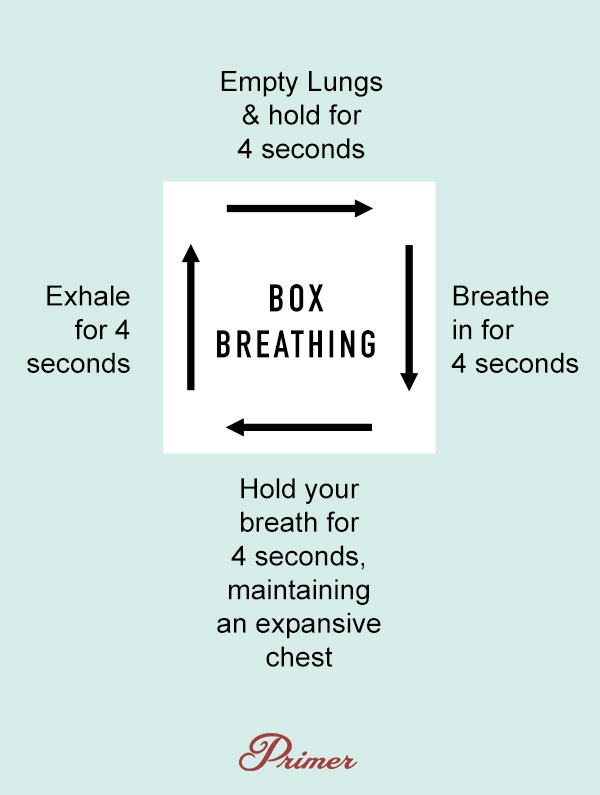
Try this: Box Breathing
Coined by former Navy Seal Mark Divine based on the techniques he was taught while in training, Box Breathing is an easy breathing exercise you can do to re-establish mental stillness no matter where you are or what you're experiencing:
- Starting with empty lungs, keep your lungs empty for a count of 4 seconds
- Breathe in for 4 seconds
- Hold your breath for 4 seconds, maintaining an expansive chest
- Exhale for 4 seconds
This is one cycle – repeat for 5 to 10 minutes for full effects, or use in quick “blips” to regain mental and emotional focus.
Medium Term Strategies
Meditation
Many people hear “meditation” and immediately picture something involving candles and incense, or standing on one leg beneath a freezing waterfall. The truth is that meditation isn’t nearly so intimidating. Rather than spending hours trying to “empty” ourselves of thoughts, mindful meditation means regularly setting aside time to calmly and nonjudgmentally look inwards – examining what we’re feeling and why we’re feeling it.
Modern life is messy, and in the tumult of it all, the things undermining our self-control won’t always be obvious. As a practice, meditation is especially useful when we’re dealing with the vague feelings of unease, guilt, and restlessness that tend to cloud daily life.
Start here: Meditation for beginners
Physical Care
In the effort to strengthen our minds, there’s an unfortunate tendency to neglect the physical aspect of things. We don’t exist independently of our bodies. Our diets and wellness feed directly into our willpower. Trying to assert self-control when we’re cold, hungry, or sick is scientifically shown to be less effective than when we’re comfortable, fed, and healthy. This should be obvious, but the reality is that plenty of guys treat willpower as a button we turn on and off, rather than a skill we develop and grow.
Here’s the truth: Exercise, diet, and better relationships with caffeine and alcohol aren’t supplemental to our psychological independence, they’re foundational. Our ability to power our minds’ defenses is directly related to our ability to breathe, pump blood, and generate the chemicals needed for us to function. Our spirits might be willing but that doesn’t mean much if the flesh is weak. There’s no way to better our brains without working on our bodies as well.
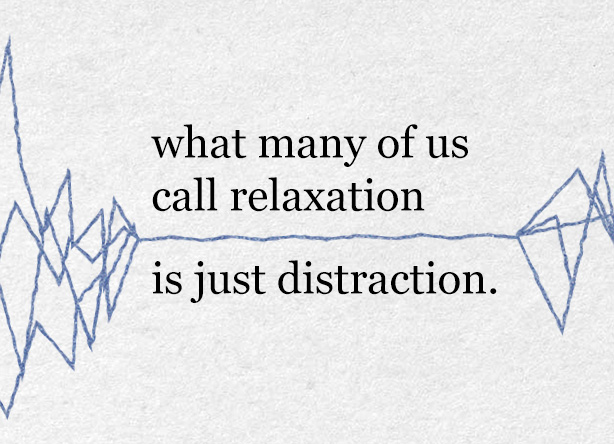
Strategic Relaxation
We suck at relaxing.
That might sound strange to us, especially in this day and age where we have every imaginable diversion at our fingertips. But it’s that exact distinction that’s responsible for so much of the disquiet inside our heads – what many of us call relaxation is just distraction.
Slumping on a couch playing video games until our eyes throb will probably take our minds off of outside stressors but it’s not going to help the parts of our minds that we use for reflection and independent thought. Depending on the intensity of the game, we may well wind up more tense, tired, and reactive than when we started. That’s not to say we can’t gun down some genocidal space-fascists, only that we need to make time for actual relaxation.
We need activities and hobbies intentionally built around lowering our heart rates, stabilizing our moods, and restoring our energy. Yes, giving our minds some space away from the worries of the world (whether real or imagined) is a part of that, but only a part. If we find ourselves doing everything we want and still feeling agitated, it might be a sign that we need to rethink how we’re handling our diversions, not just our duties.
Long Term Habits
Journaling

For chronic worriers (like yours truly), journaling is one of the single best ways to maintain our mental stillness over the long run. Not only does it let us untangle our thoughts in a judgment-free area, but looking back over past battles reminds us that we can get through them, as well as letting us recognize patterns in our behaviors. Numerous studies have even shown that journaling with an emphasis on recording things we’re grateful for can increase activity in the prefrontal cortex for months.
Not sure where to start? Try these fantastic prompts!
Philosophy
Our big-picture outlooks on the universe and our place in it shape the way we go through life – capable of giving meaning to our actions and reshaping what matters to us. As we build our own values, we free ourselves from many of the fears, anxieties, and obsessions that drive the unexamined life. We’re prompted to regularly question what we want and what’s important – rather than conforming to the pattern society has laid out for us. Life’s too short not to live it on our own terms.
Change Your Environment
Without a doubt, one of the most important and one of the most neglected lessons in self-help is this: it’s not always our fault.
When we’re emotionally exhausted by a constant stream of tragedies, absurdities, and moral outrages, we need to realize that it’s not just us that needs to be fixed – it’s the circumstances we’re living in. As much as we do need to defend our mental stillness against the outside world, there is something to be said for addressing those environmental factors head-on.
It might be time to rethink our attitudes towards work, confront our bosses or even leave our jobs. It might mean recognizing when a relationship, romantic or otherwise, isn’t working. It could very well mean trying to take on the kind of systemic injustice that makes life uncertain, unquiet, and unconscionable. And that, above all else, is the true benefit of building mental stillness. It’s not just self-help. It’s self-determination.



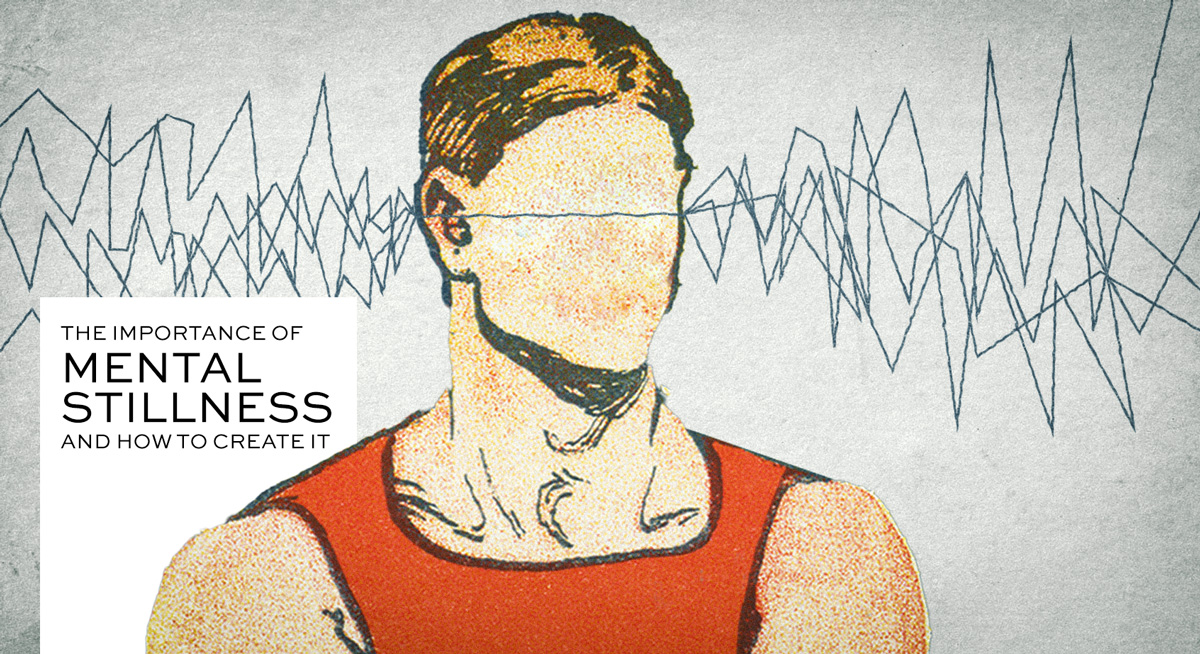






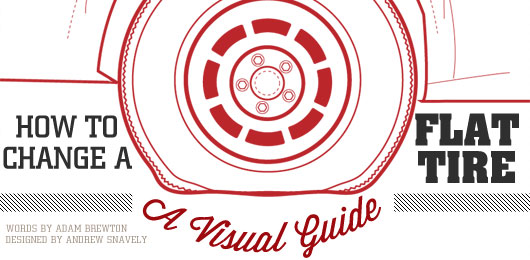

![It’s Time to Begin Again: 3 Uncomfortable Frameworks That Will Make Your New Year More Meaningful [Audio Essay + Article]](https://www.primermagazine.com/wp-content/uploads/2025/01/begin_again_feature.jpg)

